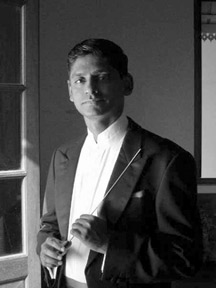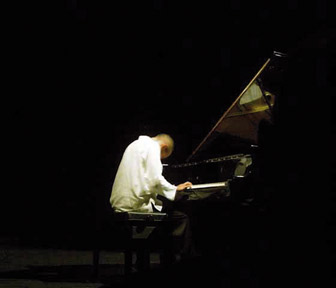A question of professionalism
By Ranga Chandrarathne
Critiquing the Symphony Orchestra of Sri Lanka (SOSL) is difficult;
it is like critiquing your Grandmother. Salt of the earth. And unlike
some extravagant uncles who came and went, she has always been there in
your life, keeping the home fires burning, bumbling on ceaselessly and
never changing her ways. She is all about nostalgia. We are fond of her,
and tolerate her many gaffes and idiosyncrasies.
 |
|
Lalanath de Silva, SOSL conductor,
2000-2002
Pic: Dominic Sansoni |
However, when she embarrasses herself and the family she represents
in public, it is our responsibility to alert her to that fact, only
because we love her, and honour her role in having helped spawn some of
Sri Lanka's greats in Western classical music, from Malini
Jayasinghe-Pieris to Tharanga Goonetileke. All, who have gone on to
achieve bigger and better things in the greater musical firmament.
The SOSL concert held on May 23, at the Ladies' College assembly hall
titled "Romantic Masterworks", was ambitious, even by their standards.
This is not the 1950s or 60s, when the Symphony Orchestra was the only
source and arbiter for Western classical masterpieces and therefore
immune to comparison.
The world has changed, and with Amazon.com, a DVD player, TV set and
good speakers, you do not even have to leave your house to have access
to the great European masterpieces played by the best. Therefore,
comparisons are inevitable. We now know what it should sound like before
attending the concert, even if the piece is billed as a Sri Lankan
first. To be fair, no one expects the Symphony Orchestra to rival those
on DVD, but that alone should not be an excuse to attempt the near
impossible.
The Norway Embassy sponsored concert opened with two short excerpts
from Edward Grieg's, (Norway's most famous son) Peer Gynt Suite no. 1,
op. 46. Apart from the obvious reasons, the excerpts were an anomaly on
the program. We would have preferred the Suite performed in its
entirety. The token representation of that great music sounded more
obligatory than meaningful.
Sergei Rachmaninoff's Piano Concerto No. 1 in F-sharp minor, Op. 1
with Harsha Abeyaratne as soloist was next. Abeyaratne, who is a
associate professor of Music at Muskingum University in New Concord,
Ohio, has been described by a Sri Lankan critic in 2003 as - "the kind
of pianist who performs with a great deal of verve, passion and creative
flair, not to mention heartfelt lyricism and poetic imagery".
The first movement marked Vivace began with a brass fanfare followed
by a florid run of octaves by the piano. It could have been the
sub-standard acoustic of the school hall and a piano that has seen
better days that contributed to many of the soloists runs coming across
indistinctly. However, we enjoyed the main theme, which had snatches of
Rachmaninoff's lyrical and harmonic ingenuity.
The short second movement was an Andante cantabile in D major, and
the soloist had many nice things to say. The quiet moments were
pleasing, with time for reflection. The third and final movement was an
Allegro scherzando, here; both the soloist and orchestra were made to
work hard. It was difficult, and it showed. Overall, the outer movements
sounded under rehearsed, both orchestra and soloist afraid to come out
from under the shell.
The last work on the program was Pyotr Ilyich Tchaikovsky's Symphony
No. 4 in F minor, Op. 36. It was unkind to our beloved orchestra.
Starting inauspiciously with an ugly sound from the French horn section,
the playing thereafter was cautious.
Other than some out-of-tune moments by the woodwind section, the
second movement was the best; the playing was smooth and evocative. The
cello section helped further vindicate the movement by some dark
expressive legato playing. The lyricism was balm to the ear. The third
movement marked Pizzicato ostinato was also pleasant. The soft plucking
of the strings of the entire section was together and well judged,
ruined though by some unfortunate non-musical noises from the woodwind
section. The fourth movement marked Allegro con fuoco, that is Italian
for very fast and fiery, was animated and at times very exciting. The
solid trumpet and trombone sections contributed admirably when they had
to. It was a pity though, that most of the hard work produced by the
musicians was undone by a lack of balance control. Disproportionately
loud playing by the percussion contributed to erasing all else on the
stage.
 |
|
Dinuk Wijeratne,
Composer and conductor |
The upper string section, that included children and many nervous
novices, could in no way match the thundering booms, thumps and clashes
of the percussion, thereby obliterating Tchaikovsky's celebrated string
harmonies and melodies.
However, on the positive side, after getting opinions from a
sprinkling of professionals from diverse artistic backgrounds who
attended the concert, full credit must be given to the Principal members
of the SOSL who valiantly held the orchestra together against all odds
in this virtuoso work, and saved the day from what could otherwise have
been an unimaginable disaster. Quoting from a early 20th century review
written on a 4th Symphony performance in London, may help in putting
into context the potential Tchaikovsky's work has in generating genuine
excitement, it states - "the fourth symphony has Tchaikovsky writing
tremendously eloquent and riveting music, where he consciously and
un-consciously pays tribute to the greatness of his Russian heritage….
this music has become important to the Russian consciousness…. the
entirely brilliant conducting brought out the veiled tensions and
volcanic eruptions of emotional anguish that saturate the symphony…. the
final moments were unleashed in a tumultuous outpouring of blazingly
exultant triumphalism that shook the very foundations of the venerable
hall". The interpretation we heard, was different. We suggest you listen
to the performance of the symphony by Valery Gergiev conducting the
Vienna Philharmonic Orchestra to clarify the above; that concert is
freely available on You Tube on the Internet. In conclusion, we offer
some practical suggestions. There seems to be an obvious scarcity of
professional conductors in Sri Lanka, and no one would disagree that
having a professional conductor in charge could change things for the
better. How difficult is it to explore the possibility of recruiting a
talented conductor like our very own Dinuk Wijeratne for instance? His
musicianship has been described as "Brilliance....a supreme musician".
His conducting credentials are relatively impressive too, the Music
Director of the Nova Scotia Youth Orchestra for four seasons along with
many appearances with the National Arts Orchestra and Symphony Nova
Scotia.
Or better yet, has the option of enticing the passionate Lalanath de
Silva back to the fold been considered? The founding conductor Dr. Earl
de Fonseca's handpicked protégé. There is strong evidence that indicates
that the orchestra under de Silva's guidance, sounded and looked much
better than it is now. More tellingly, de Silva's music programming and
overall vision was cleverer and more complimentary to the orchestra, two
departments that the SOSL needs to give immediate attention to. If these
options are unworkable, there must be plenty of young up and coming
conducting graduates from the world's great conservatories who would
relish an opportunity to work and train an orchestra in the tropics.
We really should not mind if the Symphony Orchestra of Sri Lanka
continues to do what they do, in the way they want to do it, the
orchestra being a "amateur, not-for-profit organisation which depends on
public support", to quote from their website.
But since they carry the name of our country, and as such,
unavoidably become the standard bearers and delegates of Western
orchestral music on behalf of us all.
Especially now, in the hard fought new consciousness of a unified Sri
Lanka, we would like to kindly remind them of the gravity of that
responsibility, and secondly, to take it seriously and demonstrate that
in their performances.
Perhaps some profound soul searching is necessary by all concerned,
starting from the top decision makers, as to truthfully answer the
question, are you making Sri Lanka proud?
|
Rachmaninov's music is special for Harsha
by Mahes
Perera
Harsha Abeyaratne, Pianist
and Associate Professor of Music at Muskingham University,
in New Concord, Ohio was the soloist in the recently
concluded SOSL's concert of Romantic Masterworks. As a
soloist, accompanist, chamber musician and teacher he has
performed in several cities that include Chicago, Manhattan,
Jacksonville, Charleston and Ashland, Oregon. This year's
recipient of the Ball State University School of Music
Alumni Achievement Citation Award, Harsha Abeyaratne was in
the midst of his rehearsals when we met up with him.
Any particular reason for
choosing the music of Rachmaninov?
"Rachmaninov has always been
special with me and I have a deep feeling for his passion.
The music of Rachmaninov is not easy to play but ultimately
it is how you use your muscles which will help you to play
his music."
You are back home after a
spell how do you feel playing with the Symphony Orchestra
under conductor Ananda Dabare?
"The orchestra sounds great.
Ananda is a great conductor. The year has been overwhelming
for me. I had a recital in October and a Chamber music
concert two weeks later. In the Spring a recital of piano
works of Chopin to celebrate the bicentennial birth of the
composer and now six weeks later this concert with the
Symphony Orchestra."
A student of Royal College,
Colombo who represented the College's first XI cricket team
Harsha is now an active tennis player in New Concord, Ohio.
He learnt the piano from his Mum Ranee, Lilani
Aresecularatne and Mary Billimoria. Would you share some of
your performance highlights with us? "The recitals with
George Wolfe the saxophonist, Mike Stroeher the trombonist
and the jazz violinist Randy Sabien. I haven't performed in
Europe but I have performed many solo piano recitals."
How would you encourage our
young pianists to seek a career as a pianist? "Opportunities
here in our country are lacking, so you have to get out and
get a base. There is a lot of talent among our youth and
performing regularly will get you there. I notice that
examinations are so much a culture here. I think teachers of
music should perform constantly and not fade into oblivion.
Would Sri Lankan classical
music lovers have another opportunity to see you perform
here?
"I would love to come once a
year or once in two years." When you go back is there any
special event in your career?
"I'm hoping to release a CD
of Chopin's music by the Spring of next year, so I have to
prepare for that along with my normal work as Professor of
Music. I got a grant from my faculty for the CD."
As a part of his upcoming
sabbatical work, Harsha will study with the esteemed pianist
Peter Takacs who is a Professor of Piano at the Oberlin
Conservatory of Music. Harsha is the Coordinator of Keyboard
Studies at Muskingham University where he teaches piano,
piano accompanying and music theory.
Critics have referred to
your playing as "poetic" and "passionate" was there any
special reason for choosing Rachmaninov's Piano Concerto No.
1?
"Rachmaninov re worked this
concerto and after he finished it he said that there was
nothing of the early composition in it. I enjoy playing it
because there is a 15-year-old inside me!" |
|

